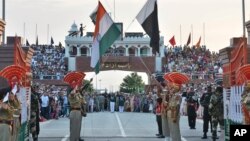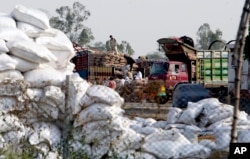Pakistan has rejected fresh calls by Afghanistan to allow the conflict-ridden landlocked country to engage in direct trade with India through its land routes, citing existing official arrangements between Islamabad and Kabul.
Afghanistan President Ashraf Ghani, before his upcoming official visit to New Delhi, has threatened to close transit trade facilities for Pakistan if it continues to refuse his country access to Indian markets through Pakistan's Wagah border station.
Islamabad, which provides Kabul with the shortest and most cost effective land route for global trade, has for decades facilitated Afghan trade through its seaports in line with their recently renegotiated Afghanistan Pakistan Transit Trade Agreement (APTTA), which also gives Pakistan access to trade with Afghanistan’s neighbors.
"Pakistan has constantly provided access to Afghanistan to Pakistani ports for transit trade. We will continue to facilitate Afghan transit trade as part of our commitment to people of Afghanistan,” said foreign ministry spokesman Nafees Zakaria in response to Ghani’s warning.
“Although, the bilateral transit trade agreement APTTA does not involve transit to and from India, Pakistan continues to allow transit of Afghan fruit to India through Wagah as a special gesture,” noted Zakaria.
Pakistan’s relations with rival India have consistently deteriorated to new lows in recent years and senior officials maintain accommodating Kabul’s calls for including New Delhi in the APTTA “is not possible under the circumstances.”
Pakistan's trade with Central Asian Republics through Afghanistan is currently insignificant and estimated to be approximately 0.054 percent of total Pakistani exports while imports from the region account for about 0.05 percent of the country’s total imports, according to an analysis of the APTTA conducted two years ago by the U.S. Agency for International Development.
It cited lack of infrastructure and transport links as well as security concerns while transporting goods from Afghanistan as major constraints for the low volumes of trade.
Relations have since suffered repeated setbacks over mutual allegations of sponsoring terrorist attacks on each other’s soils. The tensions have undermined trading ties and have lately prompted repeated closures of the main Pakistani border crossings of Torkham and Chaman, causing millions of dollars of losses to traders on both sides.
But Kabul’s ties with New Delhi continue to grow in all fields, particularly their defense ties, which apparently have raised concerns in Islamabad. Pakistan has also allege Indian intelligence agencies are using ties with Afghan counterparts to plot terrorist attacks on Pakistani soil, charges Kabul and India deny.
Afghan leaders accuse Pakistan of providing sanctuaries to the Afghan Taliban and its allied groups for plotting attacks in Afghanistan. Islamabad rejects the accusations.






